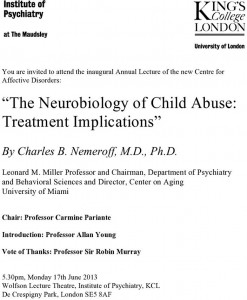It has been a good time to bury controversy. With all eyes on Washington and the fallout from the publication of DSM-5, over here in England the Institute of Psychiatry has been discretely sending out invitations to a lecture. This is not a public lecture; it is by invitation only. It is the Inaugural Lecture of a new Centre for Affective Disorders. What could possibly be controversial about that, you might well ask? It is perfectly normal for an august institution to invite an esteemed colleague to mark the launch of a new development by giving a guest lecture. This is slightly different. The lecture will be hosted by luminaries of the Institute of Psychiatry. Professor Carmine Pariante will chair the event; the guest speaker introduced by Professor Allan Young, and the vote of thanks proposed by Professor Sir Robin Murray. And who is this esteemed guest? None other than Professor Charles Nemeroff M.D., Ph.D.
Professor Nemeroff has been featured before on MIA. He is a prominent academic psychiatrist, Leonard M. Miller Professor and Chairman of the Department of Psychiatry and Behavioral Sciences, and Director of the Center on Ageing in the University of Miami. His profile on the University of Miami website documents a distinguished career littered with honours and awards. He was Editor in Chief of the journal Neuropsychopharmacology from 2002 – 2006, and Psychopharmacology Bulletin. He also served as associate editor of two other journals, Biological Psychiatry and Critical Reviews in Neurobiology and Depression. His research interests include the neurobiology of affective disorders, and he has also written about the neurobiology of trauma and abuse.
There are two things you won’t find on Professor Nemeroff’s personal page on the University of Miami website. The first is details of his extensive business interests in the pharmaceutical industry. You have to scour the pages of Bloomberg Business Week to unearth this. Here you will find out that he has had consultancies with various industry leaders, including Forrest Laboratories, GlaxoSmithKlein, Janssen, Merck, Otsuka Pharmacia/Upjohn, Somerset Pharmaceuticals and Wyeth-Ayerst Laboratories 1. He has also served on the scientific advisory boards of most of these companies.
The second thing concerns conflicts of interest. In 2009, an investigation initiated by Iowa’s Republican Senator Charles Grassley found that when Nemeroff was Departmental Chair at Emory University, he failed to report in excess of $1 million income from GlaxoSmithKlein for giving over 250 talks to psychiatrists between 2000 – 2006. During this period he held a grant for $9 million from GSK for a trial of its drug, Paxil. In December 2009 he was dismissed from his post at Emory, and also banned by the National Institutes of Health from applying for research funding for two years. Shortly after this Nemeroff was appointed to his current post in the University of Miami, after Dr. Thomas Insel, the Director of the National Institute of Mental Health, reassured the University that Nemeroff would be eligible to apply for research funding once in post. Senator Grassley subsequently wrote to the Director of NIH, Francis Collins, raising concern about the Institute funding ‘…limited Federal dollars to individuals who have previously had grant funding suspended for failure to disclose conflicts of interest.’2 On taking up his new post in Miami he successfully applied for funding for a prospective study of psychobiological risk factor for PTSD3. In May 2012 Senator Grassley asked the NIH to explain its decision to award Nemeroff this $2 million grant when he was still under investigation by the US Department of Justice.
There is something of the night about Professor Nemeroff, and the darkness in his past can be grasped through reports some years ago of the part he played in the decision by the Centre for Addiction and Mental Health in Toronto to withdraw the offer of a Chair to Professor David Healy4. Professor Nemeroff’s lecture at the Institute of Psychiatry goes under the title of “The Neurobiology of Child Abuse: Treatment Implications”. The question this raises is why is the Institute of Psychiatry so keen to ingratiate itself with this soiled Phoenix. The Director of the new Centre for Affective Disorders, and the person chairing the lecture is Professor Carmine Pariante. Professor Pariante worked at Emory in 2001, when Nemeroff was Departmental Chair5. Is the Institute of Psychiatry courting Nemeroff for financial favors through his links with the pharmaceutical industry? Who knows? We do know, however, that as recently as March 2013 the Institute, in conjunction with the London School of Hygiene and Tropical Medicine, announced nine new scholarships in global mental health funded by Janssen to the tune of almost £300,0006.
British psychiatry is in no sense perfect, but to be fair, the Royal College of Psychiatrists has worked hard to tighten up the egregious relationship between the profession and the industry. After much debate it published a set of guidelines7 to advise psychiatrists about the boundaries in their dealings with the industry, and in particular to ‘…help psychiatrists to achieve probity and transparency in ensuring that their judgement is not inappropriately influenced by commercial organizations’ (p.6) No longer are glossy adverts for drugs to be found cramming the pages of the British Journal of Psychiatry. It is probably fair to say that the foot soldiers of the profession in Britain are now more acutely aware than ever before of the problematics of their relationships with drug company representatives, of the box of Marks and Spencer sandwiches at the promotional film on Tuesday lunchtime, of the pen, the diary, and the travel alarm bearing company logos. Yet on the surface it seems that one of our most esteemed institutions, a centre of academic excellence, is beyond the moral compass that guides the rest of the profession. In the interests of transparency we should be told why Professor Nemeroff has been invited to speak at the Institute of Psychiatry. Where has the funding for the new Centre for Affective Disorders come from? Is it linked to Nemeroff’s appearance and rehabilitation? We should be told.
References
[1] Source http://investing.businessweek.com/research/stocks/people/person.asp?personId=1147871&ticker=NVDL&previousCapId=971433&previousTitle=NOVADEL%20PHARMA%20INC Accessed 28th May 2013
[2] Source http://blogs.nature.com/news/2012/05/senate-watchdog-questions-nih-award-to-controversial-psychiatrist.html accessed 28th May 2013
[3] Source http://projectreporter.nih.gov/project_info_description.cfm?aid=8290799&icde=12570413 Accessed 28th May 2013
[4] Source http://www.guardian.co.uk/education/2001/may/07/medicalscience.highereducation accessed 29th May 2013
[5] Source http://rg.kcl.ac.uk/staffprofiles/staffprofile.php?pid=923 Accessed 28th May 2013
[6] Source http://www.centreforglobalmentalhealth.org/news-events/news/gift-establishes-nine-new-scholarships-global-mental-health Accessed 28th May 2013
[7] Royal College of Psychiatrists (2008) Good Psychiatric Practice: Relationships with pharmaceutical and other commercial organizations. London, Royal College of Psychiatrists. Accessed at http://www.rcpsych.ac.uk/files/pdfversion/cr148.pdf on 29th May 2013
















http://carlatpsychiatry.blogspot.co.uk/2010/12/nemeroff-and-schatzbergs-textbook.html
Report comment
http://www.nofreelunch.org/
http://projects.propublica.org/docdollars/
Report comment
And there is something quite disturbing about the title, “The neurobiology of child abuse.” What is he saying – only kids with “neurological vulnerability” develop adverse reactions to being abused? And those kids are somehow neurologically unfit because they can’t tolerate being burned with cigarettes or locked in closets?
This is creepy…
—- Steve
Report comment
Absolutely, Steve. Look at this article just published by Acta Psychiatrica Scandinavica – The neurobiological correlates of childhood adversity and implications for treatment Acta Psychiatr Scand 2013: 1–14. It’s clear that some in the neuromanic brigade are in the process of ditching ‘schizophrenia’ in favour of establishing a biological basis for childhood adversity and trauma. And we all know who eagerly follow in their footsteps…
Report comment
“The neurobiology of child abuse.”
This is more than creepy! It is an evil thought.
Report comment
I agree.
Duane
Report comment
Thank you Phil, for taking a stand and drawing our attention to these disturbing developments. We should be told.
Report comment
BPD is used to denigrate [predominately] women survivors of child abuse, as though their “inability” to cope with such trauma is pathological – and their fault.
Report comment
Yes, Joanna, this is what psychiatry is all about. Ignore and obscure sources of trauma, abuse, neglect, etc. – social problems – and place the blame and responsibility squarely on the victim. Sickening and absurd.
Report comment
“We should be told”
The Royal College of Psychiatrists should be told as well.
The average jobbing Psychiatrist has a hard enough job on their hands creating the illusory “Theraputic Relationship” against a back drop of falling public confidence in psyhchiatry, the requirement to act within the confines of the Mental Health Act, organisational polices of all stripes and so on.
Events like this don’t help. In the end “patients” pay the price.
http://www.rcpsych.ac.uk/about/contactus.aspx
Royal College of Psychiatrists
17 Belgrave Square
London SW1X 8PG
Tel: 020 7235 2351
Fax: 020 7245 1231
Map and directions
Contacts:
Reception (general enquiries) – [email protected]
Membership office – [email protected]
Examinations – [email protected]
Press office – [email protected]/[email protected]
Publications – [email protected]
Training – [email protected]
Leaflets Department (Mental health information for all) – [email protected]
Events – [email protected]
Policy – [email protected]
CPD (Not CPD Online) – [email protected]
Library – [email protected]
Specialties – http://www.rcpsych.ac.uk/specialties/faculties.aspx
Quality (CCQI) – http://www.rcpsych.ac.uk/quality/ccqicontacts-1.aspx
NICE Guidelines from NCCMH – http://www.rcpsych.ac.uk/niceguidelines.aspx
Portfolio Online – [email protected]
Enterprise – [email protected] Telephone: 0203 328 6168
Report comment
The Royal College of Psychiatrists would almost certainly say this is a matter for the Institute of Psychiatry. Critical Psychiatry Network is writing to the Institute requesting that they withdraw Nemeroff’s invitation. I’ll post a copy of the letter and a link when this has been sent.
In the meantime can I encourage people to contact the IoP to protest at Nemeroff’s invitation, by emailing the Executive Assistant to the Dean, Jas Rana at [email protected]. The more people protest about this, the stronger the message. Academic psychiatry must be told that it has to be guided by the same ethical considerations as the rest of the profession.
Please protest!
Thanks
Report comment
@Dr. Thomas
“The Royal College of Psychiatrists would almost certainly say this is a matter for the Institute of Psychiatry.”
I’m sure you are right. They are a bunch of spineless turkeys. If one considers that they deem themselves fit to pontificate on everything things else under the sun. This!?… This!?…is the issue they would decide is NOTHING to do with them….I’m sure you are right, they would take that position…it would be laughable though….utterly laughable…
Report comment
If they still go ahead maybe a physical protest at the venue?
You know it would also be worth informing organisations who work with child and adult survivors of abuse, I’m certain they would also support protest
Report comment
I was wondering how the drug companies would make money out of the new money being put into brain research. I wonder if this is the start of the PR campaign to enable them to do so?
Report comment
I’m not sure if I’m missing something as English is my second language, but I don’t see that there is anything wrong with “The Neurobiology of Child Abuse” and nothing wrong about discussing “Treatment Implications”. I certainly doubt that Nemeroff has anything useful to say about treatment implication besides that you have to treat it with all kinds of psychiatric drugs. Has anyone read that paper?
Report comment
From the abstract (http://www2.kenes.com/wcap/scientific/Documents/The%20Neurobiology%20of%20Child%20Abuse.pdf): “Identification of the neurobiological substrates that are affected by adverse experiences in early life should lead to the development of more effective treatments for these disorders.” Two things here: 1. Why on earth do we need to identify “the neurobiological substrates that are affected by adverse experiences in early life” in order to be able to develop effective help for trauma survivors, unless the “help” we have in mind is of the chemical kind? 2. “Disorders”? Who said reacting to abuse the best way somebody knows equals a “disorder”? And, since we’re looking for “effective treatments”, which, I guess, means effective help for trauma survivors, exactly how effectively helpful is it to tell a trauma survivor their survival mechanisms represent a “disorder”?
Also, from the abstract of a related study by Nemeroff, “The Neurobiological Toll of Child Abuse and Neglect”, 2009 (http://tva.sagepub.com/content/10/4/389.abstract):”Although early life trauma elevates the risk of psychiatric and medical disease, not all exposed individuals demonstrate altered HPA axis physiology, suggesting that genetic variation influences the consequences of trauma exposure.” Aha, here we go: “not all exposed individuals”, read: only the genetically flawed, or neurologically unfit as Steve says above, ones.
Report comment
Sadly, I’m not at all surprised by this orientation. It is so du jour. We hope to solve all our social and emotional problems through chemistry. Brave new world.
Report comment
| 1. Why on earth do we need to identify “the neurobiological
| substrates that are affected by adverse experiences in early
| life” in order to be able to develop effective help for trauma
| survivors, unless the “help” we have in mind is of the chemical
| kind?
I’m sure that is exactly what Nemeroff had in mind, but this doesn’t mean research of the neurobiology of trauma is useless or harmful per se. There is nothing wrong in knowing how trauma influences neurobiology. I don’t understand why you think it’s only relevant in search for a “chemical cure”?
Report comment
I’d find it relevant in other contexts than the one that is constantly looking for a chemical quick fix, if it could help us better understand trauma and what it does to people on an existential level. I don’t see, though, that studying the neurobiological consequences of abuse and neglect necessarily helps us better understand the existential consequences of trauma. Relating to the traumatized person does. I agree with Loren Mosher here, who wrote in his “Letter of Resignation from the American Psychiatric Association” (http://www.moshersoteria.com/articles/resignation-from-apa/) “that it is very difficult to have a relationship with a neurotransmitter”.
Report comment
Thanks for reminding us of Loren’s wonderful letter, Marian, and for reminding us about the importance of the existential basis of our human relationships in helping people who have experienced trauma. If I amy be permitted a brief plug for my chapter on Soteria in Madness Contested (Thomas, P. (2013) Soteria: Contexts, practice and philosophy. Chapter 9 in (eds. S. Coles, S. Keenan & B. Diamond) Madness Contested: Power and Practice. Ross-on-Wye, PCCS Books. (pp 141-157) see http://www.amazon.co.uk/Madness-Contested-Practice-Steven-Coles/dp/1906254435/ref=sr_1_1?s=books&ie=UTF8&qid=1370090223&sr=1-1&keywords=pccs+books+madness+contested
Report comment
»No longer do we seek to understand whole persons in their social contexts — rather we are there to realign our patients’ neurotransmitters. The problem is that it is very difficult to have a relationship with a neurotransmitter — whatever its configuration«
I agree. It’s sad, that one can get the impression that trauma is some mysterious thing (and we better don’t talk about the experiences) and the best treatment are psychiatric drugs after you’ve got your diagnose.
The truth is, there is more than enough knowledge about trauma and recovery to offer much better “treatments” than psychiatry can provide. Every treatment that ignores relationships is bogus (like psychological trauma is some abstract thing that can exist separately from relationships).
Report comment
my most memorable story about Charles Nemeroff was from a CME conference I attended. He was presenting on atypical antipsychotics to treat an anxiety disorder. He joked that he had turned some poor guy into “the Pillsbury dough boy”, in reference to the awful weight gain. To the credit of the audience, no one laughed. Nemeroff looked at the audience and said, “lighten up, guys, it’s a joke”. Almost as good as Biederman’s comment to the lawyer, that he’s a full professorand the only rank above that is God.
Report comment
what a sickening statement by Nemeroff, I’ve seen women become suicidal because of the weight gain. This effect is always downplayed with diet sheets and patronising healthy eating/exercise advice offered without any recognition that the drugs alter glucose metabolism and it’s a losing battle on that front whilst on them. Then journalists often pass comment on survivors being overweight without knowing it’s iatrogenic
Report comment
Many of the drugs cause horrible sedation.
It becomes a vicious cycle, because a person is too sedated to exercise… they gain more weight, making it more difficult to exercise.
Until they’re stuck on the sofa. Many people feel depressed with the weight gain and self-medicate with junk food, as they toss in the towel, becoming morbidly obese with diabetes.
And this is happening to children as well.
Thanks psychiatry.
Duane
Report comment
“One of the really obscene things that has happened is that psychiatry has sold the idea that if you criticize drugs, you’re making parents feel guilty. What an obscenity that is. We are supposed to be responsible for our children. . . . If we’re not responsible for raising our children, what are we responsible for? If children aren’t entrusted to us for the specific purpose of our turning ourselves inside-out to be good parents, what is life about? It is a disgrace that my profession has pandered to the guilt of parents by saying, ‘We’ll relieve you of guilt. We’ll tell you your child has a brain disease, and that the problem can be treated by a drug.” – Peter Breggin, M.D., Frontline Interview (KERA Public Television)
Report comment
Any parent drugging their child today with all the known toxic effects should feel very concerned. I would say guilty, but the mental death profession has even gotten laws passed that they can rob parents of custody to force their lethal drugs on their children, so in many cases, parents have no choice except to avoid schools like the mental death centers they’ve become and home school, leave the state or find whatever other ways they can to avoid state enforced poisoning of their own children if they can!
Our so called government representatives have been too concerned about lining their pockets rather than looking out for the welfare of the nation’s children never mind all of their constituents!! Narcissism and psychopathy is all too alive and well in government to trust the likes of Joseph Biederman rather than those like Dr. Breggin and loving parents. Fascism is alive and well thanks to the global mental death/BIG PHARMA/government pathocracy!
Report comment
The title of this lecture says it all…it’s bullshit from beginning to end. Miami University, Numerhoff, Big pharma, IOP are all chasing the money. Why is no one chasing the truth? What happened to all our noble values?
Report comment